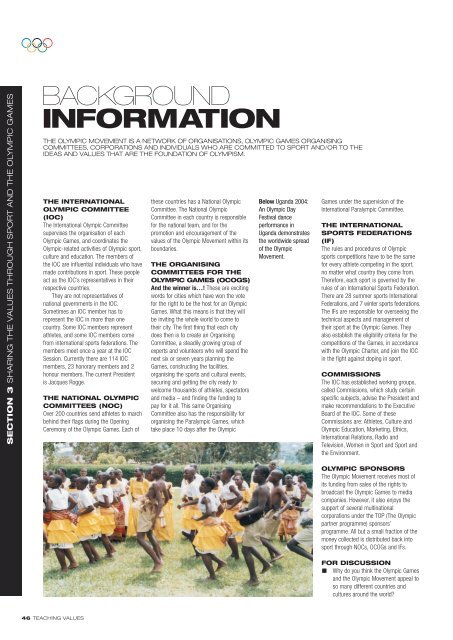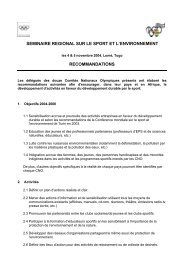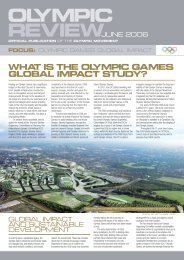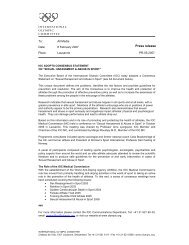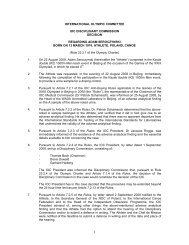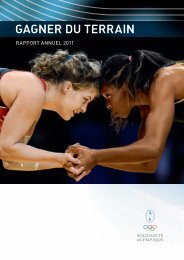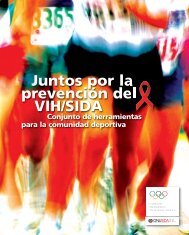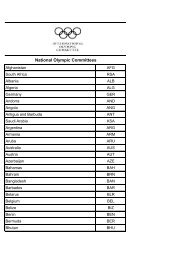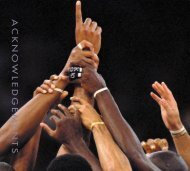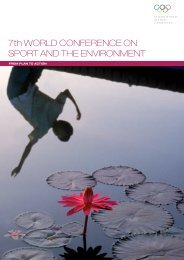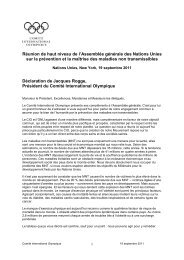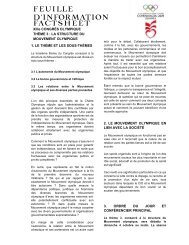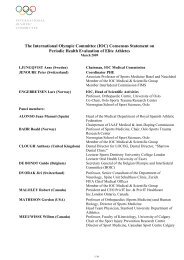Teaching Values- An Olympic Education Toolkit - International ...
Teaching Values- An Olympic Education Toolkit - International ...
Teaching Values- An Olympic Education Toolkit - International ...
Create successful ePaper yourself
Turn your PDF publications into a flip-book with our unique Google optimized e-Paper software.
SECTION 3 SHARING THE VALUES THROUGH SPORT AND THE OLYMPIC GAMES<br />
BACKGROUND<br />
INFORMATION<br />
THE OLYMPIC MOVEMENT IS A NETWORK OF ORGANISATIONS, OLYMPIC GAMES ORGANISING<br />
COMMITTEES, CORPORATIONS AND INDIVIDUALS WHO ARE COMMITTED TO SPORT AND/OR TO THE<br />
IDEAS AND VALUES THAT ARE THE FOUNDATION OF OLYMPISM.<br />
THE INTERNATIONAL<br />
OLYMPIC COMMITTEE<br />
(IOC)<br />
The <strong>International</strong> <strong>Olympic</strong> Committee<br />
supervises the organisation of each<br />
<strong>Olympic</strong> Games, and coordinates the<br />
<strong>Olympic</strong>-related activities of <strong>Olympic</strong> sport,<br />
culture and education. The members of<br />
the IOC are influential individuals who have<br />
made contributions in sport. These people<br />
act as the IOC’s representatives in their<br />
respective countries.<br />
They are not representatives of<br />
national governments in the IOC.<br />
Sometimes an IOC member has to<br />
represent the IOC in more than one<br />
country. Some IOC members represent<br />
athletes, and some IOC members come<br />
from international sports federations. The<br />
members meet once a year at the IOC<br />
Session. Currently there are 114 IOC<br />
members, 23 honorary members and 2<br />
honour members. The current President<br />
is Jacques Rogge.<br />
THE NATIONAL OLYMPIC<br />
COMMITTEES (NOC)<br />
Over 200 countries send athletes to march<br />
behind their flags during the Opening<br />
Ceremony of the <strong>Olympic</strong> Games. Each of<br />
these countries has a National <strong>Olympic</strong><br />
Committee. The National <strong>Olympic</strong><br />
Committee in each country is responsible<br />
for the national team, and for the<br />
promotion and encouragement of the<br />
values of the <strong>Olympic</strong> Movement within its<br />
boundaries.<br />
THE ORGANISING<br />
COMMITTEES FOR THE<br />
OLYMPIC GAMES (OCOGS)<br />
<strong>An</strong>d the winner is…! These are exciting<br />
words for cities which have won the vote<br />
for the right to be the host for an <strong>Olympic</strong><br />
Games. What this means is that they will<br />
be inviting the whole world to come to<br />
their city. The first thing that each city<br />
does then is to create an Organising<br />
Committee, a steadily growing group of<br />
experts and volunteers who will spend the<br />
next six or seven years planning the<br />
Games, constructing the facilities,<br />
organising the sports and cultural events,<br />
securing and getting the city ready to<br />
welcome thousands of athletes, spectators<br />
and media – and finding the funding to<br />
pay for it all. This same Organising<br />
Committee also has the responsibility for<br />
organising the Paralympic Games, which<br />
take place 10 days after the <strong>Olympic</strong><br />
Below Uganda 2004:<br />
<strong>An</strong> <strong>Olympic</strong> Day<br />
Festival dance<br />
performance in<br />
Uganda demonstrates<br />
the worldwide spread<br />
of the <strong>Olympic</strong><br />
Movement.<br />
Games under the supervision of the<br />
<strong>International</strong> Paralympic Committee.<br />
THE INTERNATIONAL<br />
SPORTS FEDERATIONS<br />
(IF)<br />
The rules and procedures of <strong>Olympic</strong><br />
sports competitions have to be the same<br />
for every athlete competing in the sport,<br />
no matter what country they come from.<br />
Therefore, each sport is governed by the<br />
rules of an <strong>International</strong> Sports Federation.<br />
There are 28 summer sports <strong>International</strong><br />
Federations, and 7 winter sports federations.<br />
The IFs are responsible for overseeing the<br />
technical aspects and management of<br />
their sport at the <strong>Olympic</strong> Games. They<br />
also establish the eligibility criteria for the<br />
competitions of the Games, in accordance<br />
with the <strong>Olympic</strong> Charter, and join the IOC<br />
in the fight against doping in sport.<br />
COMMISSIONS<br />
The IOC has established working groups,<br />
called Commissions, which study certain<br />
specific subjects, advise the President and<br />
make recommendations to the Executive<br />
Board of the IOC. Some of these<br />
Commissions are: Athletes, Culture and<br />
<strong>Olympic</strong> <strong>Education</strong>, Marketing, Ethics,<br />
<strong>International</strong> Relations, Radio and<br />
Television, Women in Sport and Sport and<br />
the Environment.<br />
OLYMPIC SPONSORS<br />
The <strong>Olympic</strong> Movement receives most of<br />
its funding from sales of the rights to<br />
broadcast the <strong>Olympic</strong> Games to media<br />
companies. However, it also enjoys the<br />
support of several multinational<br />
corporations under the TOP (The <strong>Olympic</strong><br />
partner programme) sponsors’<br />
programme. All but a small fraction of the<br />
money collected is distributed back into<br />
sport through NOCs, OCOGs and IFs.<br />
FOR DISCUSSION<br />
Why do you think the <strong>Olympic</strong> Games<br />
and the <strong>Olympic</strong> Movement appeal to<br />
so many different countries and<br />
cultures around the world?<br />
46 TEACHING VALUES


